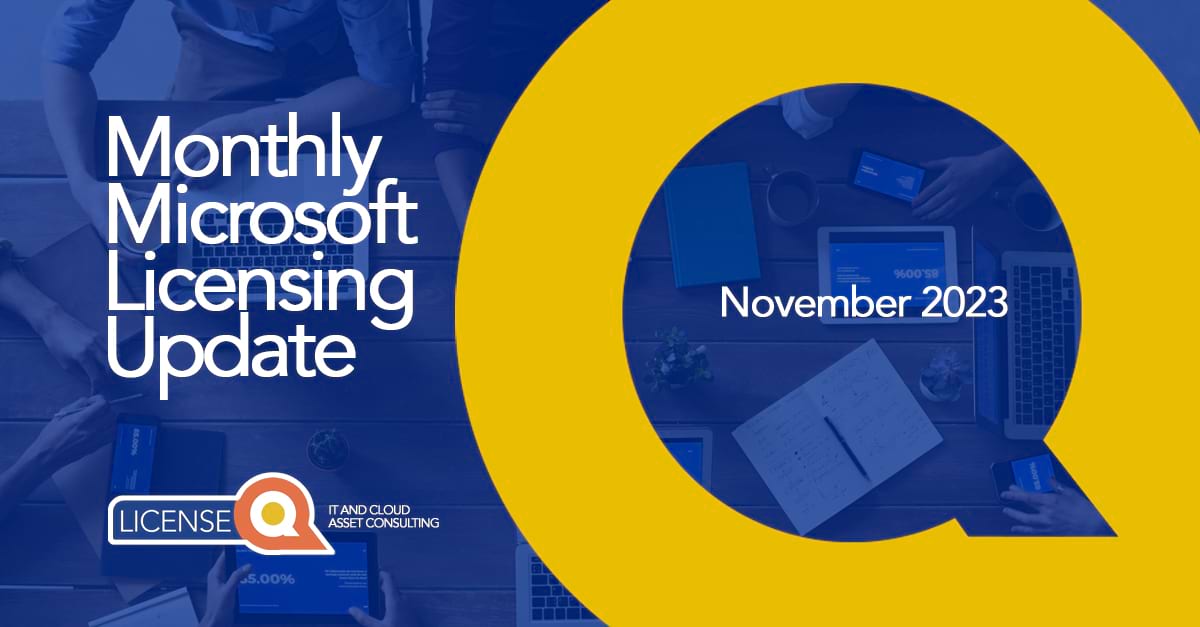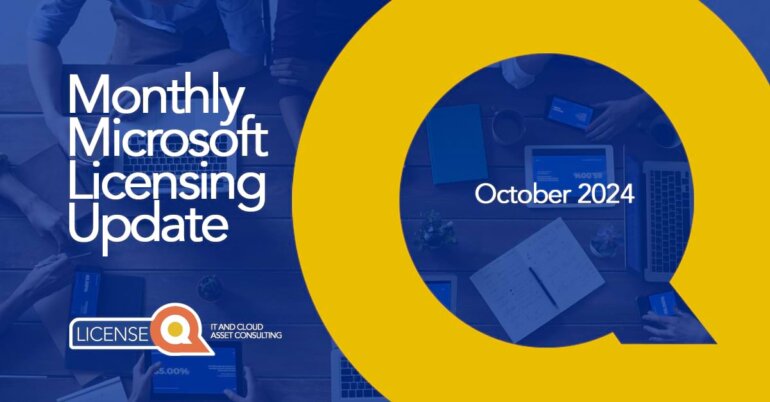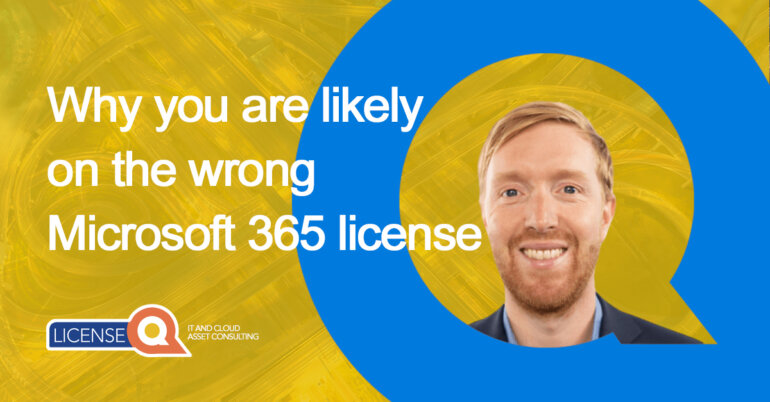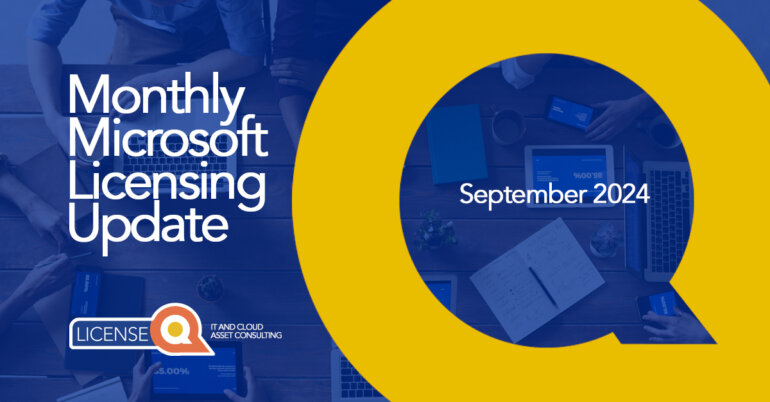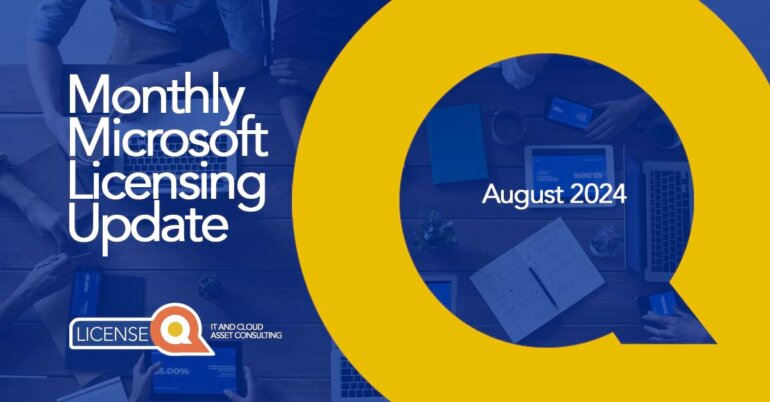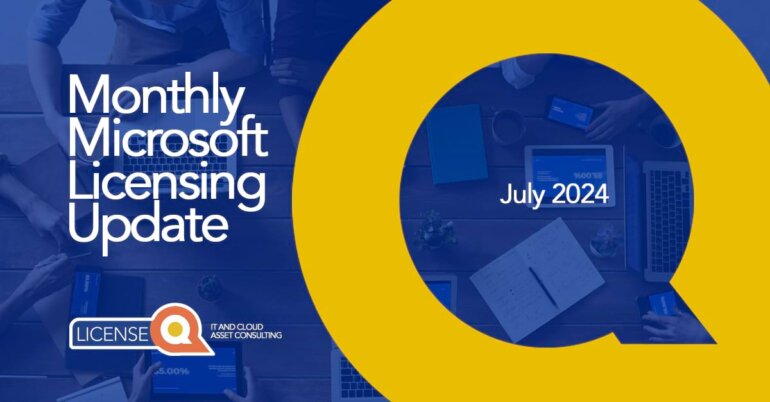Latest Microsoft licensing updates reviewed by LicenseQ
November 1st, or for some, the day now known as the release date of M365 Copilot (for enterprise). The focus on M365 Copilot is also evident in the licensing updates for this month, as they are mainly about all the AI services offered by Microsoft. Azure Open AI, Microsoft 365 Copilot, Generative AI Services, GitHub Copilot and Microsoft Fabric all have added or changed clauses in the Product Terms. Keep reading to find out more.
The buzz around AI also shows in Microsoft’s Quarterly Earnings Report. Read more on that here.
1. M365 Copilot documentation
M365 Copilot prerequisites
The Microsoft 365 Copilot documentation was released, most noteworthy being the prerequisites for M365 Copilot. A lot of these had already been shared, but the prerequisites are currently listed as:
- M365 E3 or E5 license
- M365 Apps for Enterprise
- Entra ID accounts
- Microsoft OneDrive (not stated as mandatory)
- Microsoft Outlook (needs to be on the “new Outlook”)
- Microsoft Teams
- Microsoft Loop (not stated as mandatory)
- Signed up to Current Channel or Monthly Enterprise Channel
- Alignment to M365 Network connectivity principles
Data residency
Last month, I wrote about a big update to the Product Terms regarding Generative AI Services, which made me question Microsoft’s ability to align with regulations like GDPR. However, in the data residency section of the documentation, Microsoft seems to state that this is possible.
“For European Union (EU) users, we have additional safeguards to comply with the EU Data Boundary. EU traffic stays within the EU Data Boundary while worldwide traffic can be sent to the EU and other countries or regions for LLM processing.”
This has also been updated in the Product Terms, see below.
Microsoft also states that they do not use customer data to train the Copilot models, or any LLM in general. When you input prompts using Microsoft 365 Copilot, the information contained within these prompts, the data they retrieve and the generated responses remain within the Microsoft 365 service boundary. Microsoft 365 Copilot use Azure OpenAI Services for processing, not OpenAI’s publicly available services.
One last point that I found interesting: Microsoft 365 Copilot is governed by the Early Access Program, and not yet through the Product Terms. When M365 Copilot becomes generally available, then it will fall under the Microsoft 365 Product Terms.

2. Microsoft Office Pro Plus & M365 Services
Microsoft has removed support for connecting Office 2016 and Office 2019 to to M365 services. This update was released on October 10th.
Don’t fret, it might (or will) still work, but it isn’t supported anymore. According to Microsoft, what this means “is that older Office versions might not be able to use all the latest functionality and features of Microsoft 365 services.”
The supported versions are M365 Apps for Enterprise and Office LTSC 2021. Older versions might encounter unexpected performance or reliability issues while using Microsoft 365 services like Exchange Online or SharePoint online.
Microsoft’s advice is: “[…] To provide the best experience with using Microsoft 365 services, we strongly recommend that you move off older Office versions to versions supported for connecting to Microsoft 365 services.”
3. Updates to the Product Terms
1. Universal License Terms
The Universal License Terms have several updates to the Generative AI Services clause:
- Capacity Limitations: If you use the Services too excessively, then this might result in throttling of your access to the service
- Clause for Location of Data Processing changed to remove the words “compliance boundary, or national cloud instance”. This could mean that Microsoft does hold itself to the compliance boundaries of national cloud instances in regards to the location of customer data.
- Clarification that Output Content is Customer Data and Microsoft does not own this data.
- Removal of the clause around Bing Search.
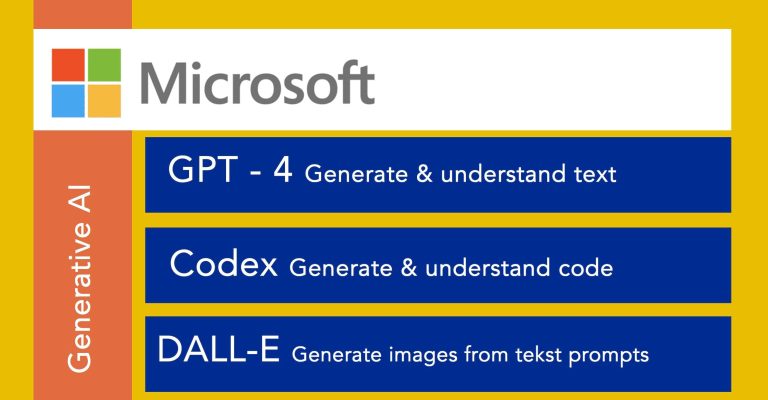
2. Microsoft 365 Copilot
Several changes regarding M365 Copilot:
- Added to the EU Data Boundary Services list of services. Meaning this will be held to GDPR standards, as we have updated you on in an earlier post
- M365 Copilot has been added to the M365 table of services. The prerequisite table has also been updated to include M365 Copilot. Required licenses are either M365 E3 or M365 E5
- Location of Data Processing: The following clause was added: “Notwithstanding the Location of Data Processing provision in the Universal Terms applicable to Microsoft Generative AI Services, when the Customer uses the Microsoft 365 Copilot, the Customer Data storage commitments applicable to Office 365 Services in the section of the Product Terms Privacy & Security Terms entitled Location of Customer Data at Rest for Core Online Services remain in effect.” This means Copilot will be GDPR compliant as far as we understand it.

3. Microsoft Azure
- Location of Data Processing: Microsoft added the following entry on the Azure page: “Notwithstanding the Location of Data Processing provision in the Universal Terms applicable to Microsoft Generative AI Services, the commitments related to the location of data processing and storage in the Product Terms Privacy & Security Terms for Microsoft Azure Core Services remain in effect for Azure OpenAI Service.”
- Azure AI Content Safety: Two clauses were added on content safety, namely:
- Acceptable use: Azure AI Content Safety can apply tags to text, image and multi-modal content to enable you to filter and remove harmful content. If you transmit harmful content to Azure AI Content Safety will not be considered a violation of the Acceptable Use Policy if this is only done to filter out the harmful content, and not collect any harmful content
- Sample content: If you provide samples to Microsoft to help the Azure AI services to tailor to your requirements you will consent to Microsoft reviewing the content and that you will abide by any requirements in that documentation, including the requirement not to include personal, confidential, or commercially sensitive information in Sample Content
- Microsoft Fabric: Microsoft added a clause stating if you use PowerBI Services within Microsoft Fabric, you will be subject to the service specific terms of PowerBI Services in the relevant Product Terms entry. Learn more about in our blog Microsoft Fabric – Everything you need to know.
- Azure Arc: Clarification added that DR and Dev/test environments do not have to be covered in Arc. If you use Arc for Extended Security Updates for your production machines, you are allowed to use the Security Updates for your DR and dev/test environments as well.
- ESUs are made available on CSP/MCA.

4. Microsoft GitHub
Changes regarding Microsoft GitHub:
- GitHub Enterprise:
- The on-premises software for GitHub Enterprise Server must be updated at least once per year
- GitHub Enterprise Cloud: Unless otherwise agreed, when you add content to a repository you will grant a license to other (third) parties under the same terms as that repository
- GitHub Copilot:
- Any code written through the help of GitHub Copilot is not considered content until it is loaded to GitHub.com
- GitHub Copilot will send prompts from code editors to GitHub to provide suggestions. These suggestions are not considered data, and are not used to train the Copilot models. They will be encrypted when send, and are not stored at rest in GitHub. GitHub is still covered by a different privacy policy which can be found here.
- In order for GitHub Copilot to be covered under the Copilot Copyright Commitment, you will need to set the Duplicate Detection filtering feature in GitHub Copilot to its “Block” setting.
5. System Center
System Center has now been made available in MCA/CSP and as such has gotten its own entry in the Product Terms for this program.
More information
We hope you enjoyed this month’s licensing update. We are genuinely excited about the developments in AI and what this will mean in terms of licensing. As always, we will keep you posted.
Reach out to us with any comments or questions regarding anything in this update or Microsoft in general. You can visit our website for more information on our services or contact our licensing experts at info@licenseq.com.

